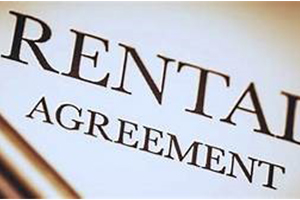
Unless you manage to sign a month-to-month rental agreement, once you sign a lease, you are locked in for a considerable amount of time. Your initial impression may have you thinking your new home has all you could ask of a landlord. But if you don’t think carefully about the content of your contract, you may have a long year ahead of you.
You should consider many things about your rental agreement, such as a security deposit, clauses in the contract, whether it is a long-term lease or a short-term lease, who pays for the wear and tear of the unit and in some cases the furniture, and so on. If you needed to get into a new rental by a certain time or you were searching for an extended amount of time, your judgment could be clouded. Clear your mind and double-check the things listed here before signing a lease or tenant agreement.
1) Ample Parking
When you arrive home from work, you want to be able to park easily. Viewing a rental on the weekend is a good idea, but may not make you aware of any parking issues. You don’t want to have to add $100 a month to the budget for parking tickets as it wasn’t in the lease. Make sure parking specifications are in your rental agreement and that you get a clear picture of what it entails.

2) Location
Renting in the suburbs is typically cheaper than a downtown location. Consider the impact living in the suburbs will have on your commute. Take the cost of gas and maintenance into consideration and assign a monetary value to the time spent commuting. A location with cheaper rent may cost more money when all things are considered.

3) Landlord Availability
When a landlord shows a rental unit, everything may appear to be bright and clean and functional. It’s important to take time to find out about the landlord’s availability when there is a problem. What would happen if the bathroom flooded late at night? Is there a repairman on call?
Review rental policies before signing. Ask for time to review the lease before making a decision. Also,f you are approved for a rental, it is acceptable to ask for a couple of days to look over the contract to ensure the terms are reasonable. Be prompt. Read the lease carefully and have someone you trust to read it too.

4) Check out the Neighbors

You or your neighbors may have no desire to get to know each other or you could become great friends. Regardless, it is wise to make an effort to speak to people who will be living nearby. Areas where people at least acknowledge one another are in safer environments than those where everyone keeps to themselves. Also, they are likely to be more forgiving of rental living inconveniences.
Do an Internet search of the property. Look around at the surrounding businesses and homes. You don’t want to spend 12 months living in a building that allows a secret rave club to occupy the building and keep you awake at night.
Viewing a rental over the weekend gives you a perspective of life when neighbors are at home. Listen to know if voices or footsteps can be heard from nearby apartments. How many children live in the neighborhood? If peace and quiet are of value to you, don’t wait until you move in to find the opposite is true.
5) Inspect the Building

Check out and go through everything from windows to water pressure. Do not assume everything is in working order. Pass on a rental where something is broken and the landlord will not commit to fixing it before you sign.
Check the units water pressure
Water pressure is a major issue. Turn on the sinks and showers to see for yourself whether water trickles or comes out forcefully. A water management system internally controls water pressure. Installing a new showerhead will not solve the problem.
Water pressure also affects toilets too. Flush them to find out how easily water goes down. Testing the water identifies major plumbing problems like temperature regulation or leaky pipe issues. Doors should open easily and sliding doors should remain on the track. A patio that cannot be accessed is not an asset. Check to see that door locks function properly.
Inspect the age of appliances
If a washer and dryer are in the unit, find out how old the appliances are. In-unit washers and dryers that don’t work are not a perk. If laundry facilities are shared, ask about how many others use them. A 15-unit apartment building with two washers and dryers is something a tenant needs to know.
Look for mold and mildew and other potential issues
Your nose is one of the best tools for viewing rentals. Therefore, pay attention to the smells you encounter. Carpets that smell of cigarette smoke from previous tenants can be addressed with a professional cleaning before moving in. If the smell is something that can’t be placed, mildew or mold may be the problem and something a tenant would likely want to avoid.
Quality property managers fix things. Things that are not fixed before you sign will not likely get fixed after you do. A building in lousy repair may cause problems when it rains or snows. Do not hesitate to ask for repairs.
It is in the landlord’s best interest to keep up maintenance on a property. Without taking action, the problem will only get worse. If the landlord or real estate agent points out things that will be fixed before you move in, document the problem by taking a photo and making notes.
A paper trail can be incredibly valuable when renting. Keep a file of related documents. It is essential that everyone moving into a rental sees it before signing the lease and moving in. If everyone cannot inspect the property at the same time, arrange an extra viewing.
6) Consider the Lighting
Humans, like plants, require sunlight. Light is sometimes a problem in large buildings. Some sunshine should at least peek in somewhere. Sunlight puts people in a better mood.

7) Value Shop

It is not recommended to view more than a few rentals in a single day. The memory starts to become fuzzy as to which features were in each rental. Compare your choice with others of similar
Take a look at the rental agreement if you suspect the monthly rent is a bit off, question them before you sign the lease. Beware of ‘extras.’ The advertised rent and what is part of the agreement can differ at times. Question everything that seems amiss. Do not move into a property without a lease. It is essential that the agreement is documented and signed by both the landlord and the tenant.